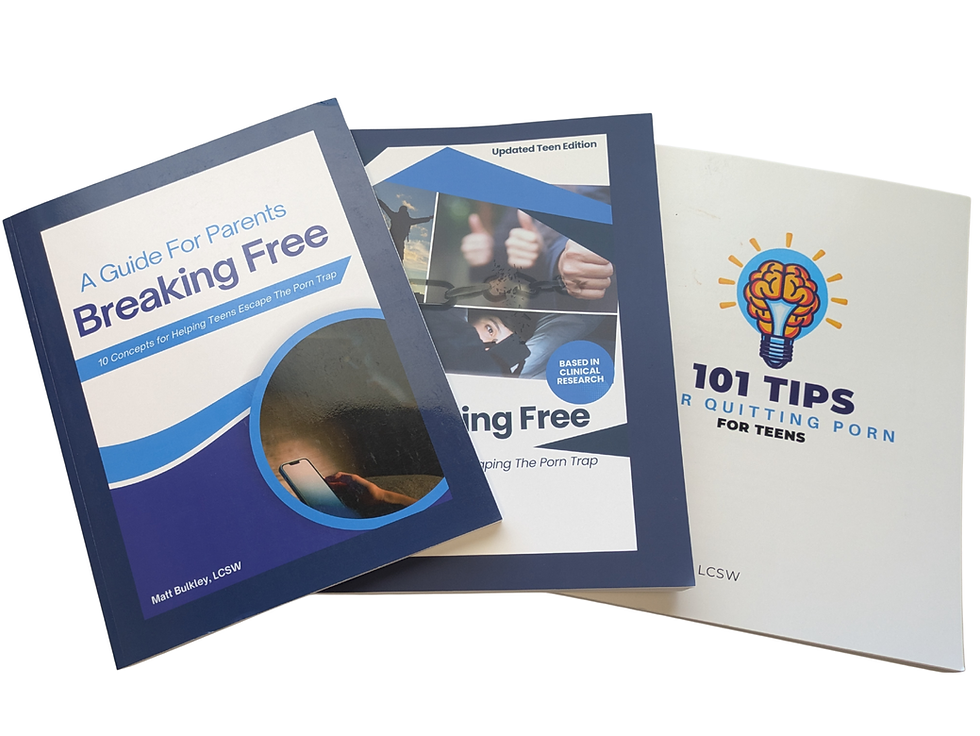Helping Your Teen Overcome Pornography Addiction: The Power of Sharing with a Trusted Friend
- Matt Bulkley

- Jun 13
- 3 min read
Updated: Jun 18
Helping Your Teen Overcome Pornography Addiction: The Power of Sharing with a Trusted Friend
As a parent, watching your teen struggle with pornography addiction can feel overwhelming. You want to support them but may not know where to start. The good news? Science points to a simple yet powerful step that can make a big difference: encouraging your teen to open up to a trusted friend about their recovery journey. Research highlights how this act of vulnerability can be a game-changer for teens working to break free from addiction. Here’s why it works and how it can help your teen.
1. A Trusted Friend Becomes Their Hype Squad
When your teen shares their goal of quitting pornography with a close friend, they’re not just venting—they’re gaining a teammate. A 2020 study in the Journal of Adolescent Health found that teens who confide in someone they trust about their recovery goals are more likely to stay committed. This friend becomes their cheerleader, offering encouragement when cravings or challenges hit hard. For your teen, having a supportive friend can make the journey feel less lonely and more like a team effort.
2. Accountability Keeps Them on Track
Opening up to a friend creates a sense of accountability that’s tough to ignore. Once your teen vocalizes their commitment to quit, it’s out in the open—they can’t just back out without someone noticing. A 2019 study in Addiction Research & Theory showed that individuals with someone checking in on their progress were less likely to relapse. For teens, a trusted friend acts like a coach, gently nudging them to stay true to their goals, even when temptation creeps in.
3. Talking It Out Strengthens Their Resolve
Sharing their “why” with a friend does more than feel good—it actually rewires their brain for success. According to Psychology Today (2021), discussing recovery goals activates parts of the brain tied to motivation and self-control. This mental boost can help your teen feel more empowered to resist urges. By talking through their reasons for quitting, they’re essentially hitting the refresh button on their willpower, making it easier to say “no” when triggers arise.
4. Friends Can Spot Warning Signs
A trusted friend can serve as an early warning system, helping your teen navigate risky situations. Whether it’s steering clear of certain online spaces or avoiding environments that might trigger a relapse, a friend who knows their struggle can offer timely support. A 2018 study in Substance Abuse found that teens with a confidant were better at dodging triggers, thanks to their friend’s ability to spot potential slip-ups before they happen.
5. It’s a Proven Strategy in Recovery Programs
The idea of leaning on trusted people isn’t just a feel-good tip—it’s a cornerstone of many recovery programs, from group therapy to Alcoholics Anonymous. Research from the Journal of Substance Abuse Treatment (2017) shows that teens who regularly talk to a friend or mentor about their recovery have higher success rates. This approach gives your teen a real-world support system, turning their commitment into a shared mission that feels achievable.
The Bottom Line: Connection Is Key
Pornography addiction can make your teen feel isolated, but sharing their journey with a trusted friend flips that narrative. It builds a support squad that holds them accountable, boosts their motivation, and helps them steer clear of setbacks. Science backs this up: teens who open up to someone they trust are more likely to succeed in their recovery. As a parent, you can encourage your teen to choose a reliable friend—their “ride-or-die”—and share their plan to quit. This simple step could be the key to helping them level up and take control of their future.
By fostering open communication and supporting your teen in building their support network, you’re giving them a powerful tool to overcome addiction. For more resources on helping your teen navigate this challenge, consider exploring professional support options or recovery programs tailored to their needs. Together, you and their trusted friend can help them stay on the path to healing.










Comments